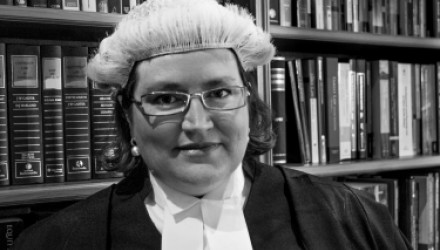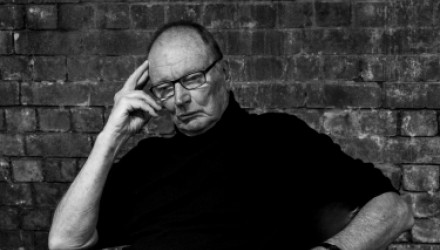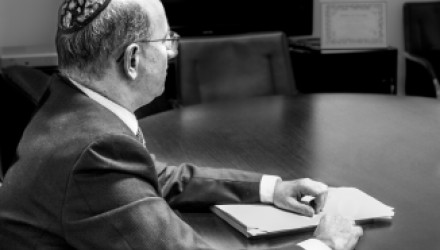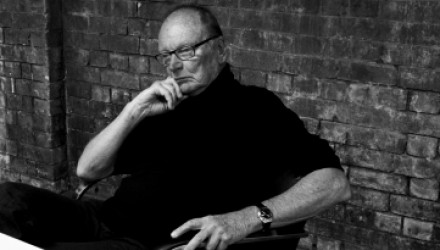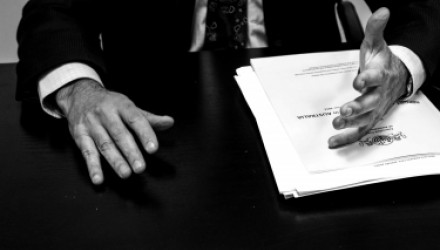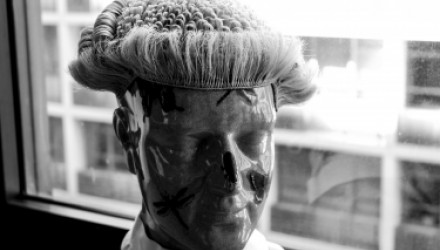The Merchant: A Sydney Docmuent is a re-contextualisation of Shakespeare's The Merchant of Venice, developed as a part of the Bell Shakespeare Company's Mind's Eye program. The Merchant transports the play into contemporary Sydney, centring on the city's financial markets, banking and futures trading, financial and legal fraternities, and it’s thriving eastern suburbs Jewish community, taking place in Circular Quay and the CBD, with Sydney’s own Rialto, the glorious Sydney Harbour Bridge, as backdrop.
The production specifically explores the ‘flesh-bond’ (hate plot) from the play, encapsulated in The Deal between Antonio and Shylock, and the 'court scene'. It juxtaposes The Storm, when Antonio’s ships are lost at sea, and compares it to the Global Financial Crisis and Sydney's international trading culture. It also delves into the ‘casket-test’ (love plot) in relation to the politics and business of marriage in Sydney.
Creative Leads, Catherine Fargher and Christopher Williams have undertaken rigorous interviews with Sydney professionals in law and the merchant banking sector. As well as helping to inform the play's modernisation, they will take on the roles of characters from The Merchant of Venice, providing unique insights into the key dramatic moments of the the play – such as the news on the Rialto, the Deal, the Storm, and the courtroom scenes – and how they would play out in contemporary Sydney.
The Merchant: A Sydney Document uses dramatic storytelling as well as a documentary collage-essay style, employing interview-based research, documentary material, and sound and media excerpts. In some cases this will be used to create a verbatim form ‘collage’, juxtaposing interview material with Shakespeare's original text. In other areas these interviews may be dramatised in ways that will take viewers or listeners to the heart of these Sydney characters, and serve to illuminate the themes and dramatic action from the play. It is influenced strongly by the Radio-Phonic possibilities of documentary interviews and editing, and will seek to incorporate this either in a fully-recorded form or as one aspect of the dramatised performance.
The Merchant: A Sydney Document continues in Catherine’s AWGIE award-winning multi-layered and inter-textual dramatic narrative style. Building on her documentary, dramatic and comic radio scripts The Violin Player, There Waits the Wolf and The Woman Who Knitted Herself a Child, it will also utilise directing expertise of Prix Italia winner and ABC Radio Producer and Director, Christopher Williams.
Click here for more on
The Merchant and other projects from the
Mind's Eye program.
INTERVIEW HIGHLIGHTS
The Storm
“I was based in London when the financial crisis took hold. Most spectacularly with Leahman Brothers failing. People cite that as the cataclysmic event; the chaos took hold. Everyone had lost complete confidence and trust in every other bank they were dealing with. No-one trusted anyone else, everyone was required to post collateral and security on any lendings. It was really the apocalypse taking place. No-one knew when it would end, everyone was ... rumours were rife, everyone was saying this bank is about to go...they're next. It was an extraordinary situation and of course we’re still facing the ripples of that five years on."
— Ian Learmonth
“… I was in the trading room in New York during 9/11, literally after the collapse of the World Trade Centre and watched a number of traders take positions on what was happening. Selling mainly, not buying. And that was extraordinary really, that felt like witnessing watching real history, watching the reaction of traders to such an extraordinary event…. definitely I question whether that was the right thing to be doing or whether everyone should be going home to look after their families and wonder about where the world was heading. It definitely raised issues about whether it was appropriate to be capitalizing on the incredible misfortune of that situation and I think it is a very ethically vexed question.”
— Ian Learmonth
The Ships
“I travel to Singapore and Hong Kong quite a lot, that flight…You overnight in Singapore and then next day you go up to Hong Kong, and then you come back again on the night flight which leaves at about, you know, quarter to ten, and then you arrive in Sydney first thing in the morning … I suppose it would have been the equivalent of sailing from Venice to Constantinople, or something like that, or to Genoa, or to one of the Italian sort of trading cities from Venice around that time … Constantinople would have been big, and the French cities as well… So there’s this constant flow of bankers and businesspeople on this … trail between Singapore and Hong Kong basically. And now it’s sort of extended up ... into Shanghai. So a lot of people …do a trip from here to Singapore, Hong Kong, Shanghai, then back ... [the equivalent of the Argosie] would be the Airbus A-380.”
— Lachlan Colquoun
“If all your eggs are in one …if all your prospects are in one ship and it doesn’t do well and the risk comes to bear, you may lose everything. One of the things that the GFC has helped to drive home to ordinary investors is that investment involves risk and in a lot of ways Investment is gambling. The GFC helped people focus on the stark reality of high risk endeavors and the consequences they can have. It made everyone realise what caution they need to have. The difficulty in Australia, is that there isn't a high level of financial literacy. These were highly complex financial products. People rely on parents and friends and financial advisors to tell them about products. There is always risk.”
— Dominique Hogan-Doran
The Deal
“From a merchant banker POV, Antonio should have paid the pound of flesh. He signed the contract and should have paid it...”
— Anonymous
"Well what it was essentially was a bad bargain, it's a bad bargain to begin with, but a bargain he was prepared to enter on what appears to be a commercial relationship...commercial terms. So bankers and business people will say, 'well that’s the bargain, I won't to be stuck with it and its too bad, you're just now getting the down side, and you were hoping for the up side, but you were always aware that there was a down side... Its not like you didn't know the pound of flesh was required if it was all to go pear shaped’, to mix my metaphors."
"The dramatic power of it is still...if you penalise someone to the extent that they lose everything, that it is so extreme. This is an emblem or metaphor for representing this kind of extremity, The value of the metaphor of the pound of flesh, is that it kind of sets up what is the value of Shylocks life and what is the value of Antonio's and do we see them one for one and do we see Antonio as more valuable? He’s a Venetian whereas Shylock is a Jew, and Portia has to argue the fate of the two of them in a circumstance where she has no rights as a female. And the irony is, here she is dressing as a man in order to save her rights, to save her beloved from this horrible bargain which he stupidly got into."
— Dominique Hogan-Doran
